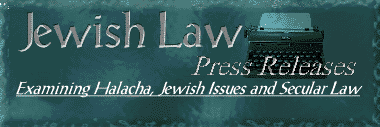

November 6, 2000
Agudath Israel press release re: Yeshiva Tuition Tax Deduction?
INCOME TAX DEDUCTION FOR RELIGIOUS SCHOOL INSTRUCTION?
Agudath Israel Cites Scientology Case, New Law in Jewish Parents' Appeal
Parents of children in yeshivos will be able to take a federal income tax deduction of the portion of their tuition payments that goes toward religious instruction, if the U.S. Court of Appeals for the Ninth Circuit accepts arguments put forth by Agudath Israel of America.
The Orthodox Jewish organization has filed a brief in the appeal of a lower court decision that denied a Los Angeles Jewish couple's attempt to claim precisely such a deduction. Michael and Marla Sklar seized upon a precedent - the Internal Revenue Service's agreement with the Church of Scientology to allow its practitioners to deduct the cost of certain religious studies and services as charitable contributions on their income tax statements - to make the claim that their children's religious instruction in two Los Angeles yeshivos merited no less consideration.
Though the U. S. Supreme Court ruled in 1989 that payments to the Church of Scientology for religious training exercises are not deductible as charitable contributions, in 1993 the Internal Revenue Service reached an agreement with the church, which was later leaked to the press, in which it pledged "not to contest the deductibility of Church of Scientology fixed donations in connection with qualified religious services." In 1994, Mr. and Mrs. Sklar claimed that the portion of their tuition payments to Yeshiva Rav Isacsohn Torath Emeth Acadamy and Emek Hebrew Academy for their children 's religious instruction - fixed by each of the two yeshivos at 55% of their total tuition payments to the school - should be entitled to the same standard of deductibility.
The lower court rejected the couple's claim and refused even to consider as evidence the precedent in the Scientology case, prompting the Sklars to appeal the decision to the U.S. Court of Appeals, which is presently considering the case.
Agudath Israel's amicus curiae ("friend of the court") brief, written by New York-based tax attorney Jay A. Friedman in conjuction with the organization' s chief legal counsel David Zwiebel and associate counsel Mordechai Biser, makes the argument that the Scientology case is relevant and fully analogous to religious instruction payments like the Sklars'. The brief argues that religious education in yeshivos qualifies as an "intangible religious benefit" - which, under Congress' 1993 amendments to the Internal Revenue Code, may be received by a donor without in any way affecting the deductibility of the donation.
The dual instructional model that is the hallmark of the yeshiva day school movement makes "each school, in effect, two schools in one: a religious studies school whose function is to educate students in the traditions of the Jewish faith; and a separate secular studies school whose function is to provide a secular education in accordance with the requirements of state law."
That portion of tuition that is clearly allocable to the religious studies program should accordingly be seen as a tax deductible contribution, says Agudath Israel, especially in view of the IRS's policy with respect to the Scientology payments.
The brief concludes with a citation of a recent article on the Sklar case in Forbes' Magazine, whose headline includes the question: "What makes tuition paid for classes in one religion more deductible than tuition for classes in another?"; and which tells its readers: "Is your family's religious education deductible? It depends on your religion." That response is entirely unacceptable, asserts Agudath Israel, and the Court of Appeals now has the opportunity to insist that yeshiva religious studies payments be treated no less favorably than Scientology religious studies payments.
For further information, please contact Rabbi Avi Shafran (212) 797-9000.
